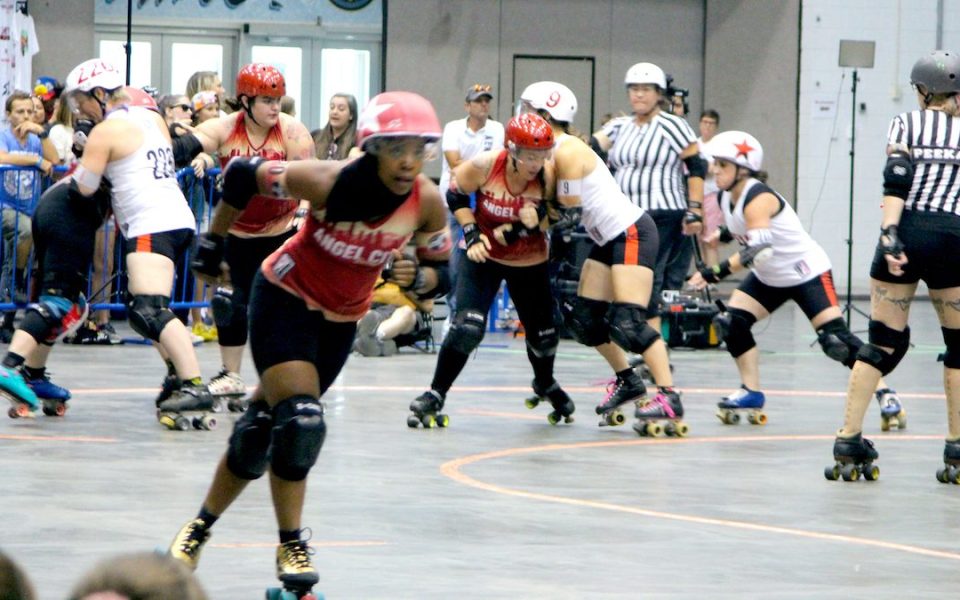Roller derby can change the world.
The message, spelled out in block letters, interrupts a blue and red background across wooden panels, in a mural sitting on the floor of the Annex at the Winston-Salem Fairgrounds
As teams from around the globe face off in the 2019 International Women’s Flat Track Derby Association Playoffs, skaters and onlookers alike take a pause from the sport to sign their name, or write messages on the collaborative mural. The weekend-long tournament, hosted by the Greensboro Roller Derby, brings the top teams from around the world, including those from France, the UK and Germany, for a chance to move on to the International Championship in Montreal in November.
Though the Greensboro team did not compete, the hosts offered up a way to commemorate the playoffs permanently, through a design that many skaters felt embodied the sport. Nay Slayer, member of the Greensboro team, painted the mural of the WFTDA’s motto, and walks around the display, pointing out different signatures of some of her favorite players.

“We thought it would be cool to tie this whole world of roller derby together,” she says.
The Greensboro Roller Derby found the issue of acceptance coming up soon after the announcement of a North Carolina city as the home for the playoffs. The initial concerns, stemming from worries over the lingering effects of anti-LGBT legislation, particularly HB2, felt relevant to the host team. However, the Greensboro team gathered a hospitality packet for players full of LGBT-friendly spots in Winston-Salem and made the Annex even more inclusive with gender-neutral signs taped over each of the bathroom doors. According to Grimberlyn Reaper, a skater and member of Greensboro Roller Derby’s marketing team, the strategies helped keep the area safe.
“There’s an amazing supportive queer comradery here,” she says. “We’re not going anywhere.”
The game for Third Place begins with a European rivalry, pitting the Paris Roller Girls against the Bear City Roller Derby from Berlin. Five skaters from each team race around the flat track, setting up defensive blocks and offensive assaults as the jammers try to lap the crowd and score points. After the jammers get though their initial lap, for each opponent’s hip they pass, they score one point.
A German chant of “Los Geht’s” or “let’s go,” echoes from the stands as the star on the jammer’s helmet peeks out from within the clump of other skaters. She breaks out and whizzes around the curves to begin scoring, and the chanting loses all structure, the rhythm replaced by loud hollering and shouting. Her black and gold uniform turns into a blur as she speeds by, her face intense, eyes dead set on the trio of opponents waiting to block her.

After their win, a merch table for the German team becomes a stop for players catching their breath. T-shirts and posters cover the table, with the team’s saying that reads, “Walls are just for roller derby.” For a player going by the name of Maya Mangleyou, the saying feels especially prevalent, and embodies the values of the sport.
“I don’t want walls in my roller derby community,” she says. “As a jammer, I don’t even want walls in my derby.”
The final game unfolds setting up the Los Angeles Angel City Roller Derby against Austin’s Texas Roller Girls. The jammers struggle to pass the initial set-up from their opponents, leaning against them with full weight. The blare of the referee’s whistle cuts through the noise whenever a skate steps over the line, sending the player to the back of the formation.
Rachel Rotten uses the congestion to her advantage, whizzing though a thin opening on one end, the wheels of her skates scratching against the floor.
The official score of 73-120 gives the win to Angel City, and the Los Angeles team revel in their gold-medal win. With glitter makeup and sweat on her face, Rachel Rotten gives a tired but satisfied smile. For her, the saying painted on wood feels personal.
Even those out of the bracket show their support, as the Atlanta Roller Derby cheers each skater and volunteer by the back door of the Annex with applause and high fives. A skater named Queen Loseyateefa scrolls through her Spotify, queuing up the next song to help keep the party going. For her, the word “sisterhood” is not encompassing enough to even describe the sport.
“It’s more of a they-hood,” she says.
Join the First Amendment Society, a membership that goes directly to funding TCB‘s newsroom.
We believe that reporting can save the world.
The TCB First Amendment Society recognizes the vital role of a free, unfettered press with a bundling of local experiences designed to build community, and unique engagements with our newsroom that will help you understand, and shape, local journalism’s critical role in uplifting the people in our cities.
All revenue goes directly into the newsroom as reporters’ salaries and freelance commissions.


Leave a Reply